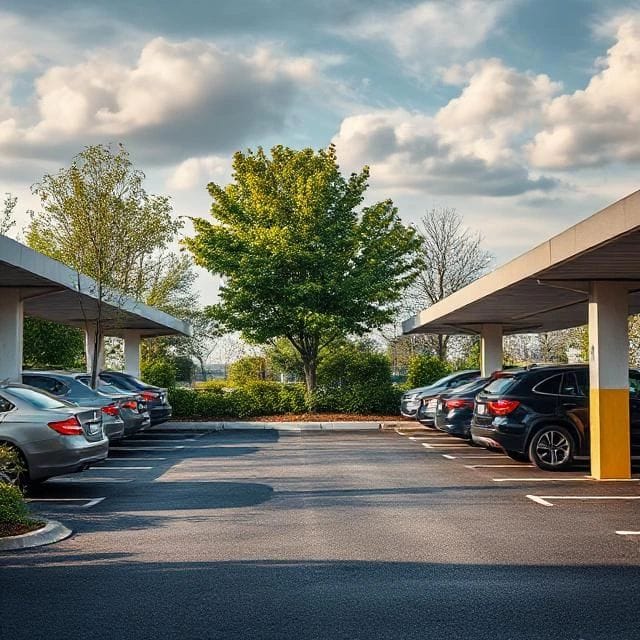Tired of guessing where you can legally park your work truck? Commercial vehicle parking rules are more complex than they seem. Whether you’re navigating tight city zones or trying to avoid that surprise citation in a residential street, understanding the laws is essential. This guide will steer you through the legal lanes of parking for trucks and commercial vehicles—without the headache.
Understanding Commercial Vehicle Parking Rules
Understanding parking laws for trucks and commercial vehicles is key to avoiding legal issues and promoting public safety. Local and state ordinances apply to any commercial vehicle that uses public parking areas or roadways. Whether it’s a van, tractor, or large vehicle used for business use, regulations ensure vehicles don’t cause congestion or disrupt neighborhoods. Parking restrictions often apply to commercial truck operators, especially during overnight stops or in limited zones.
What Is Considered a Commercial Vehicle
A commercial vehicle is any motor vehicle used to transport goods, equipment, or passenger services for profit. This includes a box truck, trailer, van, or other vehicles over 22 feet in length. Laws that apply to commercial vehicles vary, but generally they include any truck or van used for delivery, loading, or business use within a city.
Why Parking Laws Apply to Trucks and Commercial Vehicles
Parking laws help reduce roadway congestion and maintain safety in residential districts and commercial zones. Trucks and commercial vehicles are often larger and harder to maneuver, which is why cities enforce where they may park or stand or park. For example, the City of New York has strict ordinances that limit commercial vehicle parking during certain hours or locations unless a parking permit is issued.
Common Violations in Commercial Vehicle Parking
Typical violations include parking in unauthorized zones, exceeding a time limit, or leaving a trailer unattended. Drivers may receive a citation if they park in areas where signs are posted or vehicles may not stop. Other violations include parking in a public street without a permit, or obstructing active loading zones without proper clearance.
Did you know that some U.S. cities prohibit trucks from parking in residential zones after 9 PM?
Truck Parking in Residential Areas

Parking a truck in residential areas raises specific concerns, especially in narrow streets or overnight. Local municipal codes often include a prohibition against oversized vehicles or commercial vehicles parking in a residential street for extended periods.
Where Can a Truck Park in Residential Zones
Some municipal areas allow limited truck parking in residential zones if the vehicle is under 22 feet and not for commercial use. Others require a permit or restrict parking to certain hours. In all cases, parking may be regulated by signs or zoning ordinances.
Residential Parking Restrictions Explained
Parking restrictions in residential districts may prohibit parking of commercial trucks overnight or during specific hours. Vehicles that may park on residential streets are usually under a size limit or have a parking permit. These rules aim to reduce noise, protect public safety, and prevent traffic congestion.
Avoiding Citations in Neighborhood Truck Parking
To avoid a citation, drivers should always check if signs are posted and verify if vehicles in residential areas are allowed to park. Never violate local ordinances or park unattended trucks in busy residential roads. Some cities require that a truck only park during loading with a visible permit.
Read about Honda Sony electric car
Loading and Unloading Regulations
Properly managing loading and unloading helps reduce traffic flow disruptions and keeps businesses operating smoothly. Many cities designate loading zones for commercial vehicle use.
Legal Time Frames for Loading Activities
Most municipalities allow loading for up to a defined time limit, often 30 minutes. Exceeding this time without a permit may lead to a citation. These limits apply especially on public streets and near metered parking spaces.
Proper Ways to Park During Loading
When loading, ensure the vehicle is in a designated zone, not blocking driveways or pedestrian paths. Drivers should remain with the truck or return quickly after unload operations. Never leave a trailer or large vehicle unattended during active loading.
Commercial Vehicle Loading Zone Rules
Loading zones are reserved for trucks and commercial vehicles. These spaces usually prohibit passenger vehicle use and require visible permits. If signs say unless otherwise posted, check the local ordinance before using the space. Failing to comply with rules may result in fines or citations.
Did you know parking violations by commercial trucks can lead to license points in some states?
City and State Parking Restrictions
Cities and states vary in how they regulate truck parking. It’s essential for drivers to understand which parking zones are legal and what restrictions apply in each jurisdiction.
How Local Laws Affect Truck Parking
Local parking laws may differ drastically, and enforcement is handled by municipal authorities or public works departments. Some cities have off-street parking facilities for commercial vehicles, while others restrict them entirely from on-street parking.
State-Specific Commercial Vehicle Parking Rules
Each state defines where a commercial vehicle may park, especially in sensitive areas like schools or government buildings. For example, certain state roads prohibit truck stops except in designated zones. Regulations often include minimum distance from intersections and maximum time parked.
Read about AI in Film Industry
Navigating Urban Parking Restrictions
In dense cities, parking a truck or commercial vehicle can be challenging due to tight space and numerous restrictions. Many areas require a parking permit or restrict parking to commercial parking lots only. Always confirm local ordinance details before you park in urban zones.
Did you know commercial vehicles longer than 22 feet face special restrictions in most states?
Parking Citations and Fines

A parking citation can cost drivers time and money. Understanding how to prevent and resolve them helps maintain a clean driving record.
Common Reasons for Getting a Citation
Violations such as parking in a prohibited zone, exceeding the maximum time, or missing a permit result in citations. Oversized vehicles are often ticketed when they park on public streets or outside designated zones.
How to Appeal a Parking Citation
If you believe a citation was issued unfairly, you can challenge it through your city’s department of transportation. Submit evidence like photos, proof of permit, or an explanation if the vehicle was used for delivery or loading.
Impact of Repeated Violations on Truck Drivers
Multiple violations may lead to revoked permits, higher insurance, or towing of the truck. Some cities maintain a point system for commercial vehicle operators, and repeat offenses can jeopardize future parking access.
Safe and Legal Truck Parking Options
To reduce risks and stay compliant, truck drivers must know where they can park safely and legally.
Where to Park Trucks Overnight Legally
Legal overnight truck parking often requires a permit or use of commercial parking lots. Off-street parking facilities are safer, and some cities offer maps for designated zones. Never park in residential districts without checking laws.
Commercial Parking Lots and Permits
Dedicated parking lots for commercial trucks offer safer, legal alternatives to on-street parking. Many require a parking permit and charge by the hour or night. These lots help drivers comply with local parking laws.
Tips for Finding Safe Commercial Vehicle Parking
Use GPS tools that locate parking for commercial vehicles, and plan routes ahead to find safe spots. Apps can show available parking spaces near delivery points or loading zones. Proper planning prevents violations and ensures smooth operations.
Frequently Asked Questions about Commercial Vehicle Parking
Where can I park my commercial truck overnight safely?
You can park your commercial truck overnight in designated commercial vehicle parking lots, truck stops, or private lots with permission. Avoid residential streets to prevent fines.
Can commercial cars park anywhere?
No, commercial cars must follow local parking rules. Many cities restrict commercial vehicle parking in residential and downtown areas, especially overnight.
What is considered a commercial vehicle in NY?
In New York, a commercial vehicle includes any vehicle used for business and marked with company signage, or weighing over 10,000 lbs
Whether you’re a delivery pro or a small business owner, knowing where and how to park can save you serious trouble. Have you ever received a parking citation you didn’t expect? Share your story or best parking tip with us—let’s help other drivers park smarter, not harder.
Read also New Car Technology